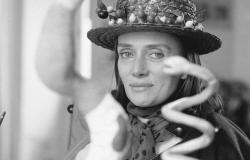With Rosalie, Stéphanie Di Giusto signs a period film that tells the story of the struggle for emancipation and self-acceptance of a playful, bearded woman, with two exceptional performers. Daniela Catelli’s review.
In rural France in 1870, Rosalie is a very beautiful young woman who is married off by her father to a disabled war veteran, much older than her, Abel, who runs a village café without luck, resisting attempts to be purchased by the local lord. Her spouses do not know each other, but she brings some of her money as a dowry and the man agrees to marry her. Always dressed from head to toe, the girl hides a secret about herself: she was born with a form of hirsutism that causes her to grow a beard and thick hair in other parts of her body. But to help Abel, and despite her reluctance, she decides not to hide anymore and to make her particularity an instrument of personal affirmation, fighting with the retrograde mentality of a country that was initially intrigued but ready to turn face and attack her.
Between the nineteenth and twentieth centuries, those who we came to know as “freaks”, or phenomena of nature, people born with physical or mental disabilities, often ended up in a mental hospital or brutally exhibited on the stages of sideshows, the traveling shows in which their deformities (although it would be more correct to say discrepancy) were exhibited for a fee for an ignorant and vulgar public, willing to pay to see these “monsters”, who were obviously free to insult or for whom in the best cases they felt pity mixed with horror. Their appeal was so strong that there were even fake ones, with people willing to undergo surgical operations and others who, without going to these extremes, passed themselves off as wonders of nature thanks to banal circus tricks. Some of these unfortunate human beings became real stars, especially in America, from the Siamese twins Daisy and Violet Milton, to the Lilliputians Harry Earles and Johnny Eck up to Prince Randian, the human torso, among the protagonists of Freaks Of Todd Browning. If we know their stories (some married and had children, others died still young and not always of natural causes) it is also because cinema and television have told them to us several times, from the tragic short life of Edward Merryck to David Lynch he dedicated a masterpiece film like Elephant Manto the protagonists of American Horror Story – Freakshow.
But what happened when the bearer of a characteristic that was outside the norm was, for example, a young, intelligent and beautiful girl from a poor family? Maybe what happens to the protagonist of Rosalieor essentially being sold to an unsuspecting man who might reject her, or worse. Stéphanie Di Giustoco-author (with Sandrine Le Coustomer) and director of the film, tells us about one of these women, forced to suffer the weight of diversity, who claims her right to love and to be accepted for who she is, refusing to go to a circus to do “di profession” the bearded woman, with the prospect of becoming a star, and deciding to expose herself to the man who rejects her but will end up loving her and the entire country. Rosalie, who dreams of being loved and who her father has forced all her life to shave and hide her body under high-necked and mortifying clothes, is a beautiful woman full of life and desire, like all of her. She would like children, she wants to know passion and sex. She is not one to give up and so she decides to turn the tables on the table: condemned to unhappiness since childhood, she makes clear (and in her own small way she becomes famous, even posing for postcards) what people’s morbid curiosity would like to see, in hope of being accepted, as happens for a while. But when something goes wrong, or even just because she appears too self-confident, presumptuous in the eyes of others to want to be considered “normal”, here are those who admired her or showed sympathy ready to lash out against her, the ideal scapegoat for the situation.
Rosalie is not only a beautiful period film, with attention to every detail, but a clear pretext to talk about contemporary society, still a slave to majoritarian aesthetic criteria and judgmental towards those who are not like everyone else, where behind the apparent and often hypocritical protection of political correctness, “different” people are bullied and attacked on social media on a daily basis, generating a society of equals in which everyone looks alike in the name of a uniform concept of beauty, forcing those who cannot or do not want to submit to these unwritten norms, or are not strong enough to do so, to suffer marginalization and isolation. It’s a film made by women that takes inspiration from a bearded woman character who actually existed, Clémentine Delaitbut he is not interested in biographism, preferring to tell another story, which still concerns women’s bodies and their right to self-determination, the desire to be liked for who they are (in the film many people desire Rosalie, among which the owner of the factory and lord of the village, who punishes her for this).
She gives life to an unforgettable character of a woman who fights for her freedom and her human desires, a very young, beautiful, talented and intelligent actress like Nadia Tereszkiewiczwho did not hesitate to undergo 5 hours of make-up every day to have what became almost a second skin applied to her face and body, hair after hair, in a splendid acting game with an expert interpreter like Benoit Magimel, who, faithful to the “Method”, did not speak to her on set except during scenes. Together – the film was intelligently shot in chronological order, or in sequence – the two give life to an exciting and convincing confrontation, which involves the spectator who reads the almost imperceptible signs of feeling on their faces. It also affects the accuracy of Di Giusto in even recounting the causes of the phenomenon of hirsutism in a scientific way and the mythology underlying the cult, later canceled by the Church, of the crucified bearded saint, Saint Wilgefortis, to whom God gave the beard to protect her from a gang rape, managing to save her virtue but not life. When a film can give you emotions and perfectly paints a past era, giving it the colors of the present, staging passions, pains and universal feelings through actors capable of restoring its truth and richness, in these difficult times for those who love cinema as an art form, it is right to be grateful to those who make it and to those who believed in it, hoping – or rather believing – that there still exists an audience capable of appreciating it as it deserves.






